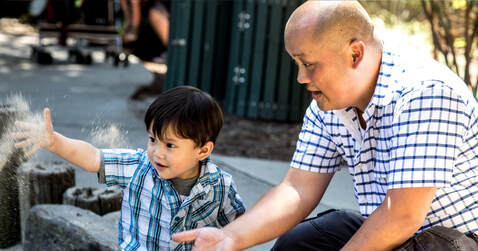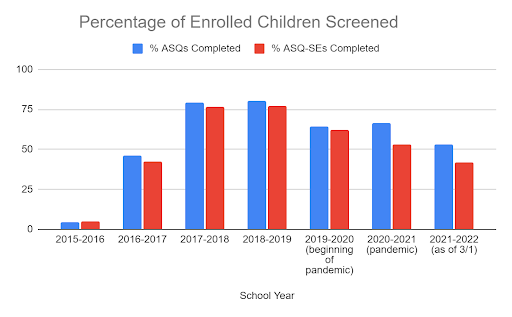 Photo courtesy of Alameda County Fathers Corps Photo courtesy of Alameda County Fathers Corps Early childhood is a pivotal time to provide the supports our children need to grow into strong adults who can reach their potential. Oakland Starting Smart and Strong is working to ensure that young children are screened for developmental, social and cognitive needs, and that necessary services are provided to meet those needs. In this blog post we highlight how OSSS and our partners at Oakland Unified School District, with the support of Help Me Grow/First 5 Alameda, have successfully scaled developmental screenings at all OUSD Child Development Centers, providing valuable information to parents and providers alike. In a future post we’ll share information about a research study on developmental screening practices across Oakland.  Developmental screenings are a vital tool to learn about children’s development and identify delays or concerns for early intervention. In fact, numerous studies show that developmental screenings with an established tool are far more effective than relying on impressions or observation alone. In early education settings, these screenings can identify areas of potential concern that families and providers can follow up on – and they can also help to open up conversations about a child’s needs. One of the most widely used screening tools is the Ages and Stages Questionnaire, or ASQ, which is designed to be filled out by parents. Said Jessica Kershner, teacher at OUSD’s Acorn Woodland center, “It is very helpful to receive parent input around their child’s development and is a useful starting point when having conversations with families.” Back in 2015-2016, with support from OSSS and Help me Grow/First 5 Alameda County, OUSD began using the ASQ for preschool aged children. The process was slow-going at first: the tool was on paper and only in English, and an initial plan to roll it out during enrollment did not yield many results. But ever since the 2017-2018 school year, the vast majority of children at OUSD Child Development Centers are screened using both the ASQ and the ASQ:SE, which focuses on socio-emotional development. The ASQ is available in 5 languages now. Screening is done online; the tool can be pulled up on parents’ phones, and filled out during visits by OUSD staff, during back to school nights and other gatherings. While enrollment dropped during the 2020-21 school year, ASQ completion was still relatively high – and served as an even more valuable tool for providers who couldn’t see children’s development in person. How has nearly universal ASQ screening improved health and development for Oakland’s young children? For one, says Zach Gilbert, Quality Enhancement Manager at OUSD, this screening has opened up avenues for conversation among parents/guardians and providers over potentially sensitive topics. It has also enabled providers to tailor lessons to children’s developmental stages, and to refer children to services when necessary. Said Dr. Dottie Lynch of Bridges Academy at Melrose, "the screening results increased the interest and skills of the teachers, parents and mental health consultant that supports our class. We created small group activities for the children with the intention to improve social and emotional development. We've also connected a few children to speech therapy and behavioral therapy." Stay tuned for a future post on developmental screening practices across Oakland. If you are an ECE provider interested in receiving training and/or technical assistance regarding using the ASQ and/or ASQ:SE, please contact Vanessa Chen at [email protected]. Comments are closed.
|
Archives
July 2024
Categories
All
|

 RSS Feed
RSS Feed